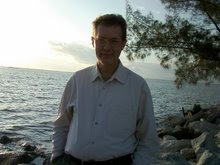Dispensationalists hold that the appearance and reign of the Anti-Christ takes place during the seven year period after the Rapture. At the end of the seven years Christ returns with His saints, defeats and destroys the Anti-Christ and his armies in the battle of Armaggedon, and sets up an earthly kingdom in Jerusalem over which He rules in person for 1000 years. The reign of Christ on earth at that time according to Scofield, will be a sitting on the throne of David, as King of the Jews, literally, strictly andpolitically understood.
This Futuristic theory of the Anti-Christ propagated by Dr. Scofield is the Popish view. "Alarmed by the fact that the Reformers were pointing to the Pope as the Anti-Christ, the Jesuit Ribera at the end of the sixteenth century, invented or at least propagated futuristic views of the Anti-Christ, and pointed to a solitary Infidel Anti-Christ who would appear in the dim future. Ribera’s view soon infected the High Church party. J. N. Darby caught the contagion, and finally Dr. D. L. Scofield swallowed the Jesuit’s pill. Thus Ribera succeeded beyond his wildest dreams, for the attention of thousands of Protestants became deflected from the Papacy, a future Infidel Anti-Christ was looked for, and the historic Protestant view handed down by the Reformers was despised by many. These are the hard facts of history. A Protestantism saturated with Ribera’s Futurism is not the Protestantism of the Reformers, nor is it feared by the Papacy." (The Roman Anti-Christ by Rev. F. S. Leahy).
In the days of the Apostle John there were many antichrists, heretics who denied either the divinity of Christ or His actual incarnation. "Even now" he writes "are there many antichrists." He also says, "Little children, it is the last time: and ye have heard that Antichrist shall come." (1 John 2:18). According to Matthew Henry the generality of Christians had been informed of the coming of the Antichrist. Paul’s 2nd Epistle to the Thessalonians Ch. 2:8-10 made it clear to them. He is called the Antichrist as though there were none but he, because he was so eminently above all others. He is, therefore, called "the man of sin" and "the son of perdition" and the system of which he is the head "the mystery of iniquity."






No comments:
Post a Comment